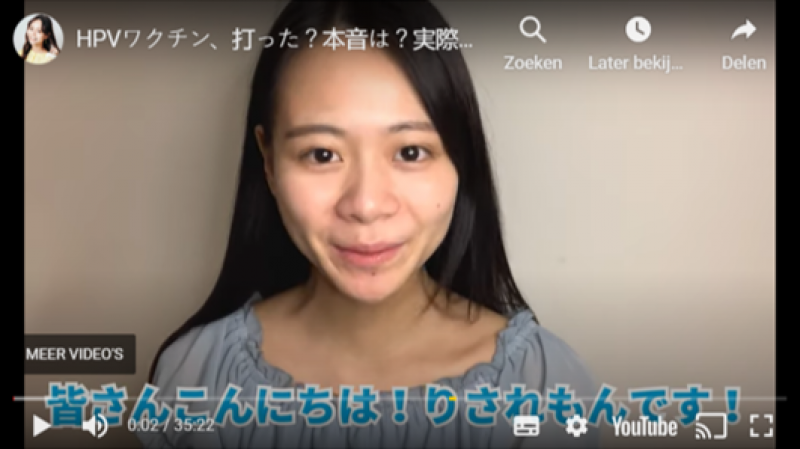Youth Advocate for the HPV vaccine in Kenya
Teenage girl striving to prevent cervical cancer in her country


Kanon Nakajima is a fourth-year medical student at Shiga University of Medical Science in Japan, with plans to focus on women’s health when she completes her studies. In 2021, Kanon and fellow medical student Tatsuki Ishimoto got into a discussion about the low level of knowledge of HPV in their country. People were either completely unaware or mis-informed about the virus and how to protect their health. Together they decided that something had to be done to address this problem, and that medical students could play an effective role. Kanon and Tatsuki formed Vcan-HPV. IPVS spoke to Kanon to learn more about the situation in Japan, and her drive to raise HPV vaccination rates to prevent cervical cancer.
Q: Kanon, tell us about Vcan – HPV what does it stand for? What is the purpose?
Vcan stands for Let’s PreVent CANcer’.
As medical students, we were shocked to learn that less than 1% of eligible girls and women were being vaccinated against HPV, the virus that causes cervical cancer. Each year, around 10.000 Japanese women are diagnosed with this disease, resulting in around 3000 deaths – preventable deaths! Meanwhile in Australia, health experts are striving to eliminate cervical cancer by 2030. What a contrast! Tatsuki Ishimoto and I decided to form Vcan, a community of medical students across the country to try to improve the situation for Japanese women. Since then, nursing school students and students from other universities and colleges in Japan have joined us.
Q: Vcan’ s mission is to create an environment where young people can ‘think proactively’ about the HPV vaccine? Can you explain this a bit more?
When I was younger, I didn't think for myself about the HPV vaccine or similar health topics. Only my mother had the right to decide whether I could be vaccinated. I want this to change because I think it is necessary for Japanese children to learn to think for themselves about their health. This will lead to more positive behavior shifts in the long run. In order to realize this change, we need to offer accurate factual information in ways which stimulate the curiosity of young people.

Q: What has Vcan been able to achieve since it started?
We try to approach young people in creative and positive ways. For example, with the help of my sister, we created a YouTube video to boost the interest from young people in HPV vaccines.
Vcan has held interactive instructional classes in junior high schools, high schools, and colleges to teach young people about HPV and the risks to motivate them to get vaccinated. We try to make it fun by doing things like having a hand painting event for college students to learn about HPV and involving a famous actor or entertainer when possible. To date we’ve reached around 350 students, with plans to reach 900 by March 2024.
To draw attention to this topic in academic circles, I wrote a paper that included a survey on the prevention of HPV infection among females and males who came of age in Japan under various scenarios of HPV vaccine recommendation. My article is published in “Human Vaccines & Immunotherapeutics, Volume 19 Issue 2.”
Q: The HPV vaccine has been included in the national standard immunization programs since 2013. However, there was a period of about 8 years where the Japanese Ministry of Health Labor and Welfare (MHLW) temporarily suspended recommendation of the HPV vaccine. In November 2021, this suspension was reversed. This was a victory that took a long time to arrive. What has happened to vaccine levels over the last two years?
Yes, re-establishing the MHLW recommendation of HPV vaccine has been an excellent policy decision. And yet progress is slow. Accurate figures of vaccine coverage are not really available, but it is estimated that around 10% of the target population has been vaccinated in 2023.
There are a number of challenges to overcome:
These are things that can be improved in order to save more lives.
Q: What about the young people who were not vaccinated during the period 2013-2021 when health officials paused the recommendation for HPV vaccination?
That group has a window of two years ending in March 2025 to participate in the ‘catch-up’ program that MHLW has arranged. Unfortunately, until now only around 10% of the eligible population has taken advantage of the program. This is concerning. Vcan submitted a survey to the Japanese Ministry of Health (JMH) to show that large numbers of college students want to receive the HPV vaccine and we hope that the ministry will extend the length of the program and allow college students to get vaccinated on campus or in the city where they study instead of having to return to their hometown.
Q: What do you think has been the key to Vcan’s success in reaching young people?
Generally speaking, doctors play a trusted role in our lives. We, medical students, can share information effectively since we are on the way to becoming doctors while also still being young ourselves. This is a powerful combination.

Q: Kanon, you are close to completing your medical studies. What is the future for Vcan once you graduate?
I recently handed over my leadership of Vcan to the next generation of medical students. Now I advise them on how to manage the team. Also, I’m studying behavioral economics as well as medicine in order to be well prepared to promote health awareness.
Q: What do you hope will happen from telling us your HPV story?
I would like the young people in Japan to understand and get actively involved in addressing this serious situation in our country. The HPV vaccination is beneficial, and cervical cancer is preventable. Also, people need to think of these issues by themselves, seek out the facts from credible sources and make their own informed decision about whether or not to get vaccinated. Don’t accept information from the internet without questioning its validity and the motivation of the source. And finally, dare to discuss HPV with friends and family members, someone’s life may depend on it.

Teenage girl striving to prevent cervical cancer in her country

Innovative way to raise awareness about cervical cancer in Jordan